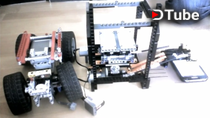
As a lego project I had to control the platform in 2D and as precisely as possible while maintaining a good performance, like you'd need it in a (3D) printer.
This video shows the thing working: on the digital site, the data is received and the motion corrected/controlled, sent back via IR to the motorics. On my S5-display, there are slanted coins rotating, which are recognised by the program and converted into a rotation angle. (to make it better controllable and programmable, the data is sent to my laptop and back, which however results in a slightly bigger delay | the delay overall might be half a second)
I trust the coins because of physics, and the scratch resistance scala: the coins are copper overdrawn bronze and much softer than the gorilla glass. Until today, I've not a single scratch on my phone :) (I am aware of sand… it should never be on my coins nor display)
The precision is a question of digital response time, well-coded-ness, reduction/translation, and how well the gears fit into each other (lag of motion).
The car on the left site is another project; it was my power source, because I was too lazy to build the battery block out of it. Just additional: the red thing on top is made to hold my phone, so I can control it via apps, too :D.
▶️ DTube
▶️ IPFS
NICE!!! Check out my lego post too :D !
Ofc :D
looks nice, too :)